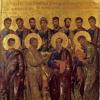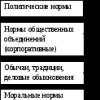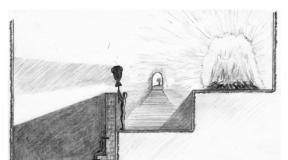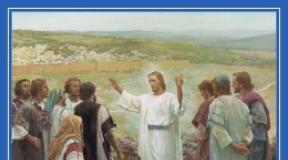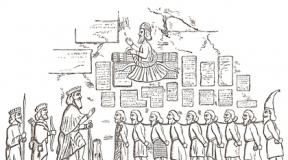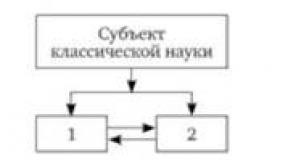How I tried to restore the position. Tell us how Mary Catholic tried to restore the position of the Catholic Church? Remember what measures were taken to strengthen the absolute monarchy in England
Question at the beginning of the paragraph
Remember what measures were taken to strengthen the absolute monarchy in England.
To strengthen the absolute monarchy, Elizabeth II rarely gathered Parliament (13 times in 45 years), a regular army appeared, harrows were forbidden to maintain personal armies, feudal lords lost power and judicial authority, local authority was transferred to the hands of royal officials, the judiciary concentrated in royal courts, the idea was spread that the king’s power is from God, therefore it can not be limited to anyone or anything.
Questions to paragraph § 13. Royalty and Reformation in England. The struggle for supremacy on the seas
Question 1. Highlight the features of the Reformation in England in comparison with the Reformation in Germany. Use the document to the paragraph.
The reformation in England was initiated by the king. The head of the church was the monarch. 3000 monasteries were closed, and their property was transferred to the royal treasury. The reformation of power did not change the structure of the church (hierarchy of the clergy) and the conduct of church rites and sacraments. The magnificent liturgy and many church holidays were canceled. Church services were conducted in English. Refusal to worship icons and relics. Tithing has been preserved, which has now been levied in favor of the king.
Question 2. Explain the structure of the Anglican church, indicate its differences from the Catholic.
The head of the Church of England is a monarch, unlike the Catholic, where the head is the bishop of the city of Rome - the Pope. The monarch appoints bishops and the highest church official - the Archbishop of Canterbury.
Question 3. Tell how Mary Catholic was trying to restore the position of the Catholic Church.
Trying to restore the position of the Catholic Church, Maria the Catholic, created a special commission to eradicate heresy and passed through parliament a decision to restore papal authority over England, as well as a law on the partial return of the church to its lands. Protestants and opponents of Catholicism were put on trial by the Inquisition and executed.
Question 4. Tell us about the death of the Invincible Armada.
A conflict was brewing between Protestant England and Catholic Spain. King Philip II of Spain, the husband of Queen Mary of Catholic, was a staunch opponent of Protestantism, which he fought in the rebellious Netherlands. The Anglo-Spanish conflict escalated due to British aid to the Netherlands, as well as because of Catholic conspiracies against Elizabeth. After the armistice in the Netherlands, Philip II equipped a squadron to conquer England - 130 ships, more than 20 thousand sailors, gunners, rowers, musketeers and soldiers.
In response, preparations began in England to repel the invasion. By order of the Queen, earthen fortifications were built around London and along the banks of the Thames. Wealthy merchants and townspeople equipped ships. Elizabeth I, riding a horse, circled the troops, promising to win or die with her people. In the naval battle, the Spaniards were defeated, and then a violent storm broke out and completed the rout of the Invincible Armada.
Question 5. Highlight and write down Queen Elizabeth’s events that ensured the success of her reign.
Upon her accession to the throne, Elizabeth I held a number of events: she approved the Church of England as a state church, swore allegiance to all secular and religious figures, executed Mary Stuart, the Catholic Queen of Scotland, who claimed the English throne, encouraged the development of industry and trade, participated in organizing trading companies and overseas expeditions, pursued a policy of economy and replenishment of the treasury, promoted the introduction of new technologies, attracting specialists in metallurgy, weaving and mining.
Tasks for the paragraph
Question 1. What are the features of English absolutism during the reign of the Tudors?
The features of English absolutism during the Tudor rule included the preservation of the powers of the Parliament, which, although it was convened much less frequently than in previous eras, nevertheless, neither Henry VIII nor Elizabeth I decided to abolish it and implemented all the most important laws with its consent.
Question 2. How do you understand the judgment of the English historian T. Macaulay, who called the Church of England the "fruit of unity" of the government and Protestants?
In England, the Reformation began "from above" in contrast to Europe, where the movement was born "from below." The Anglican Church was created by Henry VIII, who renounced the authority of the pope, made the head of the church the English crown, seized the land and property of the church, completely subordinated the clergy. These steps were accompanied by free religion, permission to conduct service in English, and translate the Bible into English.
All this gave impetus to the development of the Reformation in England, the development of Protestantism, and already later becoming Queen, Elizabeth I declared the Anglican Church state, obliged to conduct church services in English and other measures that resonated with the people. Thus, the creation of the Church of England took place by forming the mutual interests of the English crown and the Protestants, who made up the majority of the English people.
Question 3. Do you agree with what the reign of Elizabeth Tudor is called the "golden age"? Justify your answer.
Yes, I agree, because during the reign of Elizabeth I Tudor, trade, industry, and the navy developed, thanks to which a brilliant victory was won over the “Invincible Armada”, and culture and art developed (the most famous playwright W. Shakespeare lived during this period).
Question 4. In the last decades of the XVI century. the Englishman Hackluit wrote: "I cherish the great hope that our time is coming, and now we, the British, can, if we want, share the spoils with the Spaniards and Portuguese in America and other countries that have not yet been discovered." Comment on this judgment.
In this statement, Hackluit says that England could soon challenge the colonial empires of Spain and Portugal, which reigned supreme in the open New World, taking advantage of all its wealth. England had already used corsairs and privateers to attack Spanish gold galleons carrying gold from America to Europe. England, which in the XVI century. created its own fleet, will also participate in geographical research and the colonization of new lands - Hakluyt hopes.
Questions to the document
Question. Read the text and determine the purpose for which it was written. What methods of its achievement were proposed to be used?
The text was written with the aim of expounding the new structure of the church and church life in England.
The methods offered by T. Cromwell for spreading the idea of \u200b\u200bthe Reformation in society consisted in honest and sincere sermons that would explain why the English Church is no longer subordinate to the Pope and is now headed by the king himself, as well as a ban on the veneration of icons, images and relics .
“The church-organizational difference is that Catholics recognize the Roman high priest as the head of the church and the deputy of Christ on earth, while Orthodoxy recognizes the single head of the church - Jesus Christ and considers it the only right way for the church to be built by ecumenical and local councils. Orthodoxy also does not recognize secular authority over bishops and does not honor Catholic order organizations (especially Jesuits). these are the most important differences. the moral difference is this. Orthodoxy appeals to a free human heart. Catholicism - appeals to blindly submissive will. Orthodoxy seeks to awaken a living, creative love and Christian conscience in a person. Catholicism requires a person to obey and obey regulations (legalism). Orthodoxy asks for the best and calls for gospel perfection. Catholicism asks about “prescribed,” “forbidden,” “allowed,” “forgiven,” and “unforgivable.” Orthodoxy goes deep into the soul, seeking sincere faith and sincere kindness. Catholicism disciplines an external person, seeks outward piety and is satisfied with the formal appearance of doing good (see "ours" No. 119). and all this is closely connected with the initial and deepest act distinction, which must be thought through to the end and, moreover, once and for all. "
Answer posted by: Guest
The 17th century was turbulent in Europe and Russia. the war between the talk of the Commonwealth, the most powerful state in Europe and Russia, barely recovered from the great turmoil. the first estate, both here and there, are noble lords, magnates, and close boyars. omnipotence and arrogance are everywhere, the remnants of the heritage of patrimonial feudalism in centralized states, however, serfdom almost everywhere did not exist in western Europe, while in Russia and the Commonwealth there was still servility to the position of complete slaves. the owner could kill his slave with impunity and did not bear any responsibility to anyone. also, the position of the peasantry in the form of tenants in the west was much easier than that of bonded serfs.
Answer posted by: Guest
9 solomon
Answer posted by: Guest
1) in the framework of the revolution in Russia, the Bolsheviks pursued the ideology of Marxism-Leninism (the idea of \u200b\u200bworld revolution), that is, revolutionary Russia sought to extend the ideology to other countries (aiding with the communist parties of other countries)
2) the capitalist powers sought not to contact the socialist revolutionaries, since they were a threat to the market capitalists
3) after the conference, the capitalist countries recognized the Bolshevik regime of the RSFSR as legitimate. After the Rappal Treaty, allied relations between Germany and the RSFSR were established, the importance of the RSFSR growing in the international arena
How do you like the essay?
Martin Luther. Representatives of all classes took part in it, this was the most important event of the country. And therefore, this topic is relevant now. The reformation in Germany is studied in detail by many modern scholars, and they also often make a documentary about it. The purpose of my essay is to examine the impact of the reformation on the country. And the research question is: “How did the Martin Luther Reformation affect Germany?” I think there were more positive influences than negative ones. Firstly, as a result of the Reformation, the Catholic Church lost significant power in Germany. This fact was very important in the development of the country, because the church never liked innovation, because this could negatively affect them, and every time she took discoveries and different ideas for heresy. Of course, without innovation there was no development. But after the reforms, the situation changed, more and more new discoveries appeared, which contributed to the rapid development of the country in the 18th century. Secondly, the Reformation positively influenced the spiritual interests of the inhabitants of Germany. In the 16th century, many people were unhappy with the church for their expensive rites, self-interest, great wealth and vast land holdings. Therefore, people no longer considered the church "salvation of the soul." And the ideas of Martin Luther, which claimed that man does not need intermediaries between God, opened the door to true faith for them. As a result, a new religious movement appeared - Protestantism. Thirdly, the Reformation left stunning literary monuments like “95 theses”, “Article writing”, “Twelve articles”. Most of these are written thoughts about religion. Fourth, most of the lands of the Catholic Church were secularized. In general, secularization and supremacy over the church were the main reason for the success of the Luther Reformation, because for the princes it was a huge prey and they had no choice but to accept the reforms. However, the Reformation brought not only “pluses”, but also “minuses”. Firstly, in 1524 a civil war broke out, which lasted a year. Its cause was the discontent of the peasants associated with the restriction of their freedoms, an increase in corvee and church tithes. They were ready to recognize only such secular orders that can be justified by the texts of the Bible. Unfortunately, the rebels not only lost, but also worsened their position. About 100 thousand people died in the war, and the majority of the victims were peasants. Secondly, during the Reformation of the war, many historical monuments associated with Catholicism were destroyed: icons, churches, etc. This is a huge loss for German art. In the course of my research, I concluded that the Reformation as a whole had a positive effect. She contributed to the development of Germany, the emergence of Protestantism and remarkable literary monuments, the expansion of the state’s holdings of secularization. But there were negative influences: civil war, the destruction of catalytic monuments.
Please rate the 16-point system strictly and honestly. Thank you so much!




